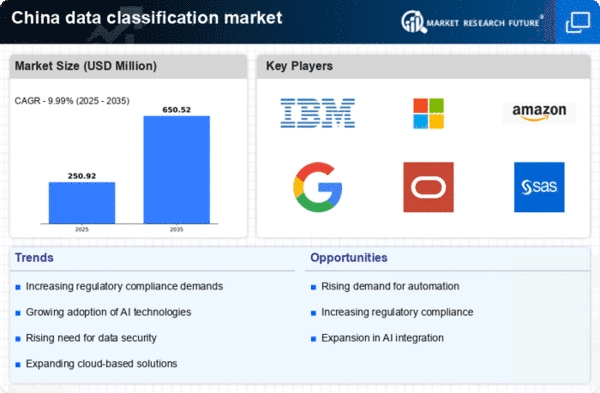Rising Data Volume
The data classification market is experiencing a surge due to the exponential growth of data generated across various sectors. With an estimated 2.5 quintillion bytes of data created daily, organizations are compelled to implement effective data classification strategies. This necessity arises from the need to manage, store, and retrieve vast amounts of information efficiently. As businesses increasingly rely on data-driven decision-making, the demand for robust data classification solutions is likely to escalate. The market is projected to grow at a CAGR of approximately 20% over the next five years, indicating a strong upward trajectory. This growth is further fueled by the digital transformation initiatives undertaken by enterprises, which necessitate the categorization of data for enhanced operational efficiency. Consequently, the rising data volume is a pivotal driver for the data classification market.
Emergence of Cloud Computing
The emergence of cloud computing is significantly impacting the data classification market in China. As organizations increasingly migrate to cloud-based solutions, the need for effective data classification becomes paramount. Cloud environments often host vast amounts of sensitive data, necessitating robust classification mechanisms to ensure data security and compliance. The cloud computing market in China is projected to grow at a CAGR of 25% over the next five years, indicating a strong shift towards cloud adoption. This trend is likely to drive demand for data classification solutions that can seamlessly integrate with cloud platforms. Furthermore, the flexibility and scalability offered by cloud computing enable organizations to implement dynamic data classification strategies, enhancing their ability to manage data effectively. Thus, the emergence of cloud computing serves as a crucial driver for the data classification market in China.
Evolving Cybersecurity Threats
The data classification market is significantly influenced by the evolving landscape of cybersecurity threats. As cyberattacks become more sophisticated, organizations are increasingly recognizing the importance of classifying data to protect sensitive information. The rise in data breaches, which reportedly affected over 1 million individuals in recent years, underscores the urgency for effective data classification solutions. By categorizing data based on sensitivity and risk, organizations can implement targeted security measures, thereby mitigating potential threats. This proactive approach not only enhances data security but also ensures compliance with regulatory requirements. The increasing awareness of cybersecurity risks is likely to drive investments in data classification technologies, contributing to the overall growth of the market. As a result, the evolving cybersecurity threats represent a crucial driver for the data classification market.
Increased Focus on Data Analytics
The data classification market in China is being propelled by an increased focus on data analytics across various sectors. Organizations are recognizing the value of data-driven insights for strategic decision-making, leading to a heightened demand for effective data classification solutions. By categorizing data, businesses can streamline their analytics processes, enabling them to extract meaningful insights more efficiently. The market for data analytics in China is projected to reach $30 billion by 2026, indicating a robust growth trajectory. This growth is likely to drive investments in data classification technologies, as organizations seek to enhance their analytical capabilities. Moreover, the integration of advanced analytics tools with data classification solutions is expected to create synergies that further enhance operational efficiency. Consequently, the increased focus on data analytics is a key driver for the data classification market in China.
Government Initiatives and Policies
Government initiatives and policies play a vital role in shaping the data classification market in China. The Chinese government has been actively promoting data governance frameworks to enhance data management practices across industries. Recent policies emphasize the importance of data classification as a means to ensure data security and privacy. For instance, the implementation of the Personal Information Protection Law (PIPL) mandates organizations to classify personal data, thereby fostering a culture of responsible data handling. This regulatory environment is likely to stimulate demand for data classification solutions, as businesses seek to comply with legal requirements. Furthermore, government support for technological innovation and digital transformation initiatives is expected to bolster the data classification market. As such, government initiatives and policies serve as a significant driver for the data classification market in China.
















